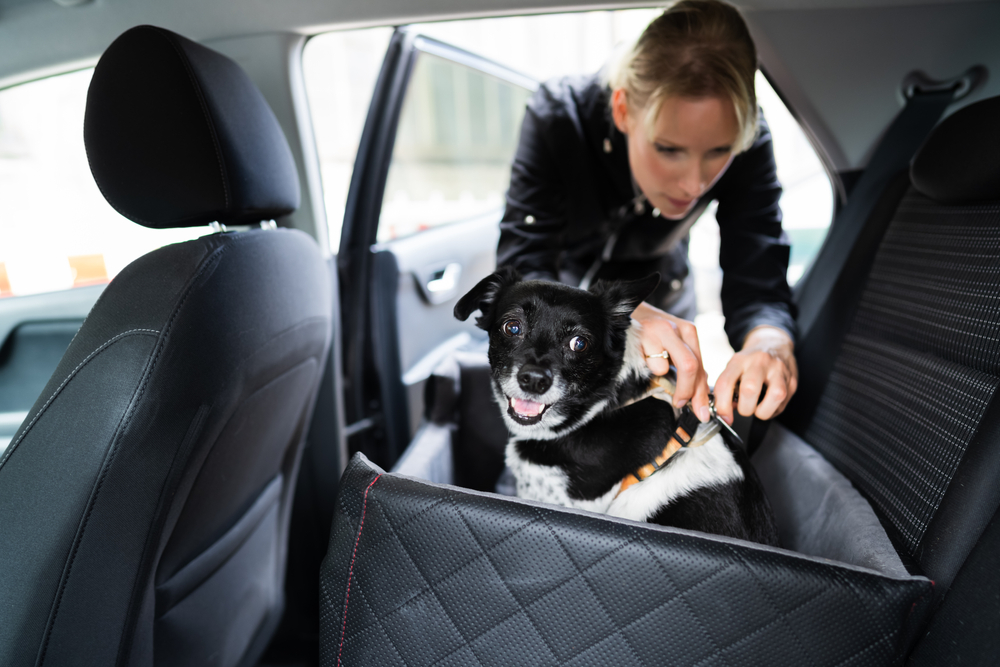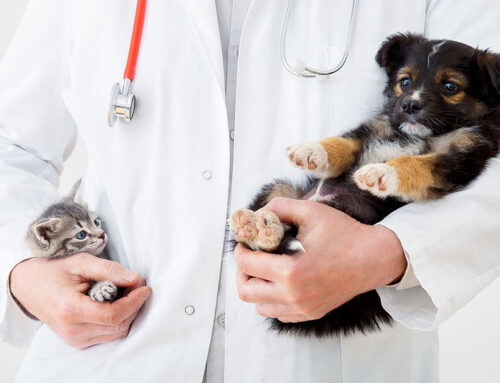As the end-of-year holiday season kicks into high gear, your ever-present to-do list keeps running through your mind. Have you bought all the ingredients you need for your famous sweet potato casserole? What about that last-minute present for your work gift exchange? And, don’t forget to set up the guest bedroom for your soon-to-arrive family.
With such a long to-do list, you could easily forget about your pet and making the holidays pet-safe. You will need to add a few more items to your to-do list—and some to your “to-don’t” list—to ensure your four-legged friend has a wonderful and safe holiday season.
DO check that decorative plants are not toxic
Brightening up your home with flowers and plants is an excellent way to add cheer to the season, but many holiday plants are toxic to pets. Some may cause only excessive salivation and mild stomach upset, while others can lead to a severe drop in blood pressure or kidney failure. Assess a plant’s pet toxicity risk before adding plants or flowers to your decor. You must definitely avoid the following:
- Mistletoe
- Holly
- Lilies
- Daffodils
- Amaryllis
- Cyclamen
While holiday poinsettias have long been thought to be pet-toxic, they actually are not. The sap can irritate your pet and cause drooling and vomiting if they eat large enough quantities, but the plant is not poisonous.
DON’T share toxic foods with your pet
Holiday feasts boast mouthwatering main courses, savory side dishes, and decadent desserts, but many of these foods can cause health problems for your pet. Vomiting, diarrhea, pancreatitis, gastrointestinal (GI) obstruction, kidney disease, liver failure, and a host of other issues can develop if your pet gets their paws on a holiday meal.
Avoid sharing the following dangerous foods with your furry pal:
- Turkey and ham
- Mashed potatoes
- Stuffing
- Corn on the cob
- Unbaked yeast dough
- Chocolate
- Raisins, currants, or grapes
- Onions, chives, or garlic
- Xylitol
DO pet-proof your tree
Pets are naturally drawn to Christmas trees, whether real or artificial. Prevent a Christmas catastrophe by pet-proofing your tree with the following suggestions:
- Anchor the tree — If your feline friend tries to scale your Christmas tree, they likely will knock the tree over and be injured. Securely anchor the tree to prevent tipping.
- Avoid dangerous ornaments — Sharp hooks, delicate glass, twinkly tinsel, and exposed electrical cords all pose threats to your pet, so either avoid putting these items on your tree or block your pet from getting too close.
- Block access to the treestand — The tree water can quickly become stagnant and a breeding ground for bacteria. You may also add fertilizer to keep your tree smelling fresh until the new year. Prevent your pet from drinking from the treestand to avoid health problems.
- Sweep up fallen needles — Although pine trees aren’t pet-toxic in the traditional sense, their spiky needles can cause significant GI distress, especially if consumed in large quantities. Sweep up needles daily, and watch your pet to ensure they do not chew the branches.
DO hang your stockings with care
And, not only your stockings—take care with tinsel, light strands, fragile decorations, and all other potentially dangerous holiday decor. Keeping these items out of your pet’s reach will require some ingenuity since curious pets can find myriad ways to investigate novelties. Pets love to latch onto and pull down treat-filled socks, for example, so avoid fragile or heavy stocking holders, or hang stockings from the top of a doorway your furry pal cannot reach. Those shiny strands of tinsel are best skipped entirely, as they can cause life-threatening GI obstructions if swallowed. Run electrical cords behind furniture or hide them with covers. Place other fragile or potentially hazardous items where they are inaccessible to your pet. Depending on your pet, you may have to switch to pet-safe decor.
DON’T wait until the last minute to refill your pet’s prescriptions
If your pet is on daily medication for a chronic condition, such as diabetes, heart failure, anxiety, or arthritis, ensure they don’t run out over the holidays by calling our team well in advance for medications your pet will need refilled. And, remember to ask about altered business hours to ensure you can pick up the prescriptions in time.
DO ensure your pet is prepared for holiday traveling or boarding

Whether you take your four-legged friend traveling with you for the holidays or book a stay at our luxury boarding facility, a few tasks need to be completed beforehand, including:
- Updating necessary vaccinations — Protect your pet by updating any vaccinations they need.
- Gathering paperwork — Print a copy of your pet’s medical and vaccination records to have on hand and, if necessary, ask your veterinarian for a health certificate that must be completed before you travel.
- Reserving flights or accommodations — Book travel or boarding arrangements well in advance of the holiday season to ensure your pet has a reservation.
- Packing your pet’s bags — Prepare the essential items, such as food, treats, toys, bed, collar, and leash, that your pet will need for traveling or boarding. Check with the airline or boarding facility for exact instructions.
Amid all the chaos and commotion of holiday celebrations, your four-legged friend can easily get into mischief. If your pet becomes ill or injured over the holidays, contact our Veterinary Medical Center of Indian River County team for emergency veterinary care.







Leave A Comment